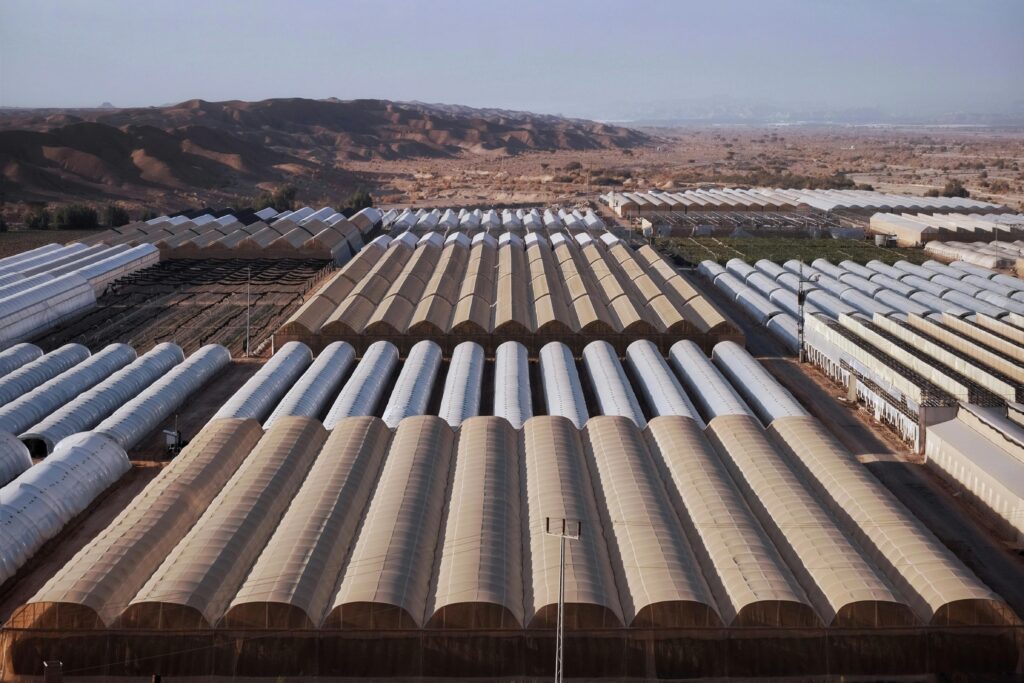In the heart of the Middle East, where vast stretches of arid land seem inhospitable, a remarkable transformation is taking place. Israel, a nation renowned for its innovation and resilience, has turned the desert into a thriving agricultural hub. This remarkable feat not only highlights Israel’s technological prowess but also underscores a broader narrative of human ingenuity in overcoming environmental challenges.
A Harsh Environment Transformed
Israel’s agricultural revolution began with a formidable challenge: the country’s landscape is predominantly desert or semi-arid, characterized by scorching temperatures and minimal rainfall. Historically, this harsh environment was considered unsuitable for traditional agriculture. Yet, Israel’s leaders and scientists envisioned a different future—a vision of lush, productive land amid the desolation.
In the early 20th century, pioneers who settled in the region faced the daunting task of transforming barren land into productive farmland. Their efforts laid the groundwork for a series of innovations that would revolutionize desert agriculture. The key to their success was a combination of scientific research, technological innovation, and an unyielding determination to make the desert bloom.
Innovation at the Forefront
Central to Israel’s agricultural success is its pioneering work in irrigation technology. The development of drip irrigation stands as one of the nation’s most significant contributions to modern agriculture. Drip irrigation, which involves delivering water directly to the plant’s roots through a network of tubes and emitters, drastically reduces water wastage. This method proved to be a game-changer in a region where water is a precious resource.
Israeli scientists and engineers did not stop with drip irrigation. They also innovated in soil management, creating techniques to improve soil fertility and structure in arid conditions. One such technique is the use of organic matter and compost to enhance soil quality, making it more conducive to plant growth. Additionally, the development of advanced greenhouse technologies allowed for the cultivation of high-value crops in controlled environments, further expanding agricultural possibilities.
Embracing Sustainable Practices
Sustainability is at the heart of Israel’s agricultural revolution. Recognizing the importance of conserving natural resources, Israeli farmers and researchers have embraced practices that minimize environmental impact. The integration of renewable energy sources, such as solar power, into irrigation systems and greenhouses is a prime example of this commitment.
Moreover, Israel has made significant strides in water recycling and management. The country has become a global leader in wastewater treatment, with a substantial portion of treated wastewater being reused for agricultural purposes. This approach not only conserves freshwater resources but also reduces the environmental footprint of agriculture.
From Desert to Global Influence
The success of Israel’s agricultural innovations has not only transformed its own landscape but also positioned the country as a global leader in agri-tech. Israeli companies and research institutions are now sharing their expertise with countries facing similar challenges. From collaborative projects in developing nations to partnerships with international agricultural organizations, Israel’s influence extends far beyond its borders.
One notable example is the partnership between Israeli companies and farmers in Africa. By implementing drip irrigation and other advanced technologies, these collaborations are helping to increase food security and improve livelihoods in regions that struggle with water scarcity and poor soil conditions. The transfer of knowledge and technology is a testament to the global impact of Israel’s agricultural revolution.
The Future of Desert Agriculture
Looking ahead, the future of desert agriculture in Israel remains promising. Ongoing research and development continue to push the boundaries of what is possible. Innovations in genetic engineering, precision agriculture, and automated farming are poised to further enhance productivity and sustainability.
Furthermore, Israel’s commitment to addressing climate change is shaping the future of its agricultural practices. As global temperatures rise and weather patterns become increasingly erratic, Israeli researchers are developing resilient crop varieties and adaptive farming techniques to ensure continued agricultural success in an unpredictable climate.
Conclusion
The transformation of Israel’s arid land into a flourishing agricultural powerhouse is a testament to human ingenuity and determination. Through groundbreaking innovations in irrigation, sustainable practices, and global collaboration, Israel has turned a seemingly inhospitable environment into a fertile ground for growth and prosperity. As the world grapples with the challenges of climate change and resource scarcity, Israel’s experience offers valuable lessons in resilience and innovation. The blooming desert of Israel stands not just as a symbol of agricultural success, but as a beacon of hope for transforming adversity into opportunity.










